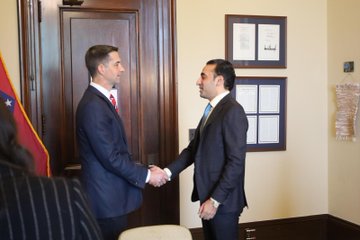During a series of crucial meetings on Capitol Hill, PPP Chairman and former foreign minister Bilawal Bhutto-Zardari warned US lawmakers about India’s aggression. Speaking to the House Foreign Affairs Committee, he described India’s growing hostility as a direct threat to South Asia’s stability.
Bilawal urged American lawmakers to support Pakistan’s “mission of peace.” He asked them to help create room for dialogue before tensions explode into a full-blown war. He was leading a senior-level Pakistani delegation, which engaged in wide-ranging talks about the regional crisis, the Kashmir conflict, and US-Pakistan ties.
The delegation held important meetings with members of the US Congress. Their goal was to present Pakistan’s stance and shed light on New Delhi’s provocative actions. The team included top officials like Hina Rabbani Khar, Sherry Rehman, Dr Musadik Malik, Khurram Dastgir Khan, Jalil Abbas Jilani, Tehmina Janjua, Bushra Anjum Butt, and Syed Faisal Subzwari.
These talks were part of Pakistan’s diplomatic outreach. They came shortly after a deadly confrontation with India. Both countries launched attacks across the border following the Pahalgam incident in IIOJK, which killed 26 tourists. In response, India carried out airstrikes inside Pakistan. Islamabad struck back under “Operation Bunyan-um-Marsoos.”
The 87-hour standoff ended on May 10 after a ceasefire brokered by the United States. But in his latest meetings, Bilawal reminded the US that the truce was only a starting point. He stressed that peace remains fragile and the risk of war still looms.
Bilawal briefed US lawmakers like Jack Bergman, Tom Suozzi, Ryan Zinke, Maxine Waters, Al Green, Jonathan Jackson, Hank Johnson, Stacey Plaskett, Brian Mast, Brad Sherman, Greggory Meeks, Henry Cuellar, and Senator Tom Cotton.
A key concern raised by Bilawal was India’s suspension of the Indus Waters Treaty. He called it a breach of international law. He said that India’s aggression now includes using water as a weapon. “Threatening to cut water supplies to 240 million Pakistanis is a step toward war,” he warned. He said such actions could create an irreversible disaster.
While thanking the US for its role in defusing the crisis, Bilawal called the ceasefire “just the beginning.” He explained that the region remains unstable. He said the world is less secure today than it was before the recent conflict. He warned that India’s hostile behaviour leaves almost no buffer between incidents and war.
He pointed out that even unverified terrorism cases in India can now lead to military retaliation. “This level of danger has never existed before,” he said. Prime Minister Shehbaz Sharif, according to Bilawal, gave the team a “peace mission.” That mission focuses on diplomacy and finding peaceful solutions.
Bilawal asked US lawmakers to back this initiative. He urged Washington to help in restoring peace and encourage India to talk. “If the US supports this cause, India might be pushed toward the right path,” he said. He emphasized that the Kashmir dispute must be resolved through dialogue. It is, he said, in everyone’s interest.
Bilawal also called on the US to help launch real talks between the two nations. He said that India’s aggression must be stopped before it sets the region on fire. Pakistan’s Ambassador to the US, Rizwan Saeed Sheikh, thanked the American officials for their time and attention.
Later, in a press conference, Senator Sherry Rehman said the 87-hour war was only a trailer. She said Pakistan’s military reply was measured and legal. “This conflict is part of India’s tactic to keep the region on edge,” she stated. She criticized Indian media for fueling war narratives and silencing peace efforts.
Rehman warned that even a small mistake could lead to nuclear disaster. “This is a heavily populated area. A nuclear war here would be beyond control,” she cautioned. She thanked the US for its mediation, but also warned that without real negotiations, the next conflict might be catastrophic.
She added that a solution to the Kashmir issue lies in honest and global talks. She accused India of rejecting all formats of talks—whether bilateral or multilateral—and said it avoids third-party help, which is essential for peace.

